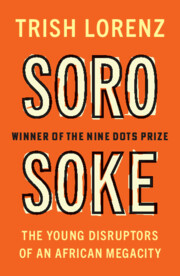‘We need to create dialogues between Africans and African Americans and Black people globally, because the success of Africa is the success of Black people everywhere.’
***
‘I was born here. I grew up with my grandmother and went to primary school here and I had a lot of resonance with Nigerian culture. But in 2002, when I was 12 going on 13, I moved to America to be with my parents. My mum had a restaurant in Chicago – it was Nigerian food, well specifically Yoruba food. I worked at the restaurant when I went to grade school and after university I got to a point where I realised that being a chef is what I want to do. So I went to culinary school in Napa Valley, worked around California and then went to New York to work at 11 Madison Park.

Figure 21 Michael Elégbèdé, 32, is chef and founder of Lagos fine dining restaurant Ítàn Test Kitchen
Throughout this whole experience I found myself in a place of almost losing my drive, my aspiration, everything I loved about food, because of the realities that surrounded my experiences in these white-dominated, Euro-centric, highly racist cultures. You look at the history of Black people in these types of restaurants, they’ve been operating for over 10 years and there hasn’t been any Black sous chef. Not that there hasn’t been any Black staff. You would have someone who comes in from Scandinavia, spends two months then gets promoted. I’m working just as hard as any of them, I’m just as good as any of them but I would have comments like “yeah you’re good but you’re probably going to end up frying chicken somewhere”. Everything that surrounded that reality started making me lose myself and lose my desire to be in food.
I saw myself going down a very bad rabbit hole and I started asking myself what made me fall in love with cooking in the first place. And the answer was our food, my food. Cooking Euro-centric food day in and day out wasn’t telling my story. I didn’t see myself in what I was doing and that’s what it should be about. So, I bought a one-way ticket and moved back home. I started travelling around the country, cooking in remote areas, diverse areas, learning and literally falling in love with Nigeria in a way that very few people get to do.
Black food culture, what we do here, is often overlooked. We’ve done a representation of northern Nigerian food, a menu from the south-east, from the south-west, and a menu about the diaspora. I’ve never seen African Americans as different to us but developing the diaspora menu brought me so much closer, in a way that I didn’t expect. I had to think of what it would feel like as a Nigerian who loves Nigeria and loves my culture, to be taken to a place of nothingness and trying to find something to grab onto that is home. I was so heartbroken, in a way that I’ve never been. I’ve been heartbroken over slavery and being in racist environments, but I’ve never really put myself in a position to feel the pain of being taken away. That was a very painful place to go to. And then it became lighter the more I found dishes that evolved from West African food into something just as beautiful. And that was what this menu was to me: an exploration of our stories, our narratives and really understanding what it felt like to have gone through that.
It is very important for Africans and African Americans to create platforms that exchange narratives, that allow us to find synergies in our stories, in our realities, in our cultures. To find those bridges. They are there, we just need to go back and trace them. Black people in America standing up for their rights is giving the appetite to other movements like #endSARS here. There’s this cross-pollination that’s always there but we are not aware, or at least not bringing it to light. We need to create dialogues between Africans and African Americans and Black people globally, because the success of Africa is the success of Black people everywhere. The expression of Africa in its truest form, in a genuine form, is a pride for all Black people. At the core of it for everyone in general but especially for Black people.’


